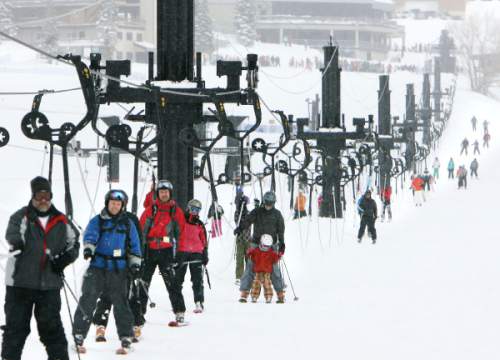This is an archived article that was published on sltrib.com in 2016, and information in the article may be outdated. It is provided only for personal research purposes and may not be reprinted.
A federal appeals court has upheld the dismissal of a lawsuit challenging the no-snowboards policy at Alta ski resort.
In a 3-0 ruling, the Denver-based 10th U.S. District Court of Appeals on Tuesday agreed the suit filed by snowboarders could not go forward because the ban was a decision made by the ski resort, not by the U.S. Forest Service, which leases the land to the resort.
Alta Ski Lifts Company, a private company, operates the 2,130-acre ski area, which includes 1,800 acres of forest service land.
"Alta's pleased with the decision and thinks that the court got it right," attorney Rick Thaler, who represents the ski resort, said.
Jonathan Schofield, representing the snowboarders, said in a statement: "While we are disappointed with the Court's ruling, we presented our best arguments and respect the judicial process.
"Notwithstanding the outcome, the case has generated significant attention, highlighting Alta's policy and the conflicts surrounding it. At this point, we can only hope that Alta will one day voluntarily join the vast majority of ski resorts by lifting its snowboarding ban and providing both skiers and snowboarders the opportunity to recreate on public land regardless of whether people choose to slide down the mountain on skis or a snowboard."
The snow sports advocacy group Wasatch Equality, snowboarders Rick Alden, Drew Hicken and Richard Varga and snowboarding pro Bjorn Leines filed suit in January 2014 against Alta and the forest service, arguing that the ban has no place on public land.
The suit claimed the snowboard prohibition was the result of animus "towards the type of people they believed to be 'snowboarders.' " The boarders alleged they were being irrationally discriminated against and deserved protection under the 14th Amendment to the Constitution, which historically has been used in cases involving discrimination based on race, gender or sexual orientation.
Alta and the forest service argued the Equal Protection Clause did not apply to the snowboarders' claims because the ban was not "state action."
U.S. District Judge Dee Benson in Salt Lake City agreed and dismissed the suit in September 2014, ruling that the forest service did nothing to influence Alta's decision to ban snowboards. Also, the decision was based on a rational business model that includes a desire to market to skiers only, the judge said.
Two other resorts ban snowboarding: Deer Valley in Utah and Mad River Glen in Vermont.
Twitter: PamelaMansonSLC



